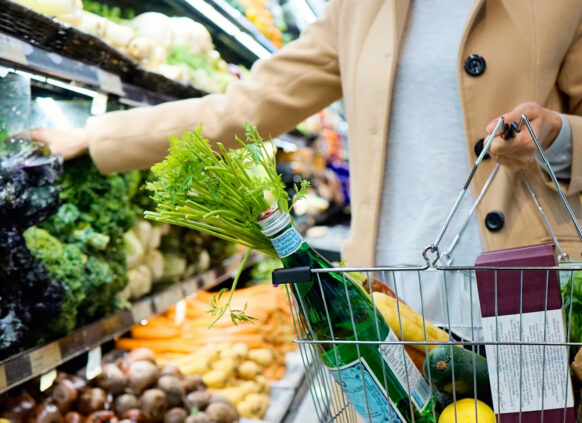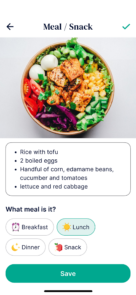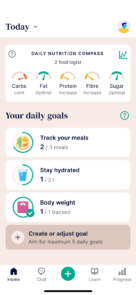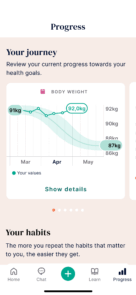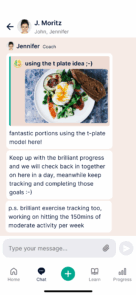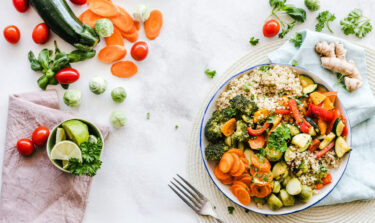
What are the best foods for weight loss?
Weight loss can be a challenging journey, and it’s completely natural to want support along the way. The foods you choose can make a big difference in helping you feel your best and reach your weight loss goals.
Learning what foods to eat to lose weight not only empowers you to make choices that align with your health but also helps create lasting habits.
Oviva’s NHS-funded weight management programme offers a tailored weight loss plan and support from UK healthcare experts to help you choose the best foods for your weight loss journey.
Key Takeaways
- Certain foods such as vegetables, fruits, whole grains, proteins, and healthy fats play a key role in weight loss due to their high nutrient density and ability to promote satiety.
- Oviva can support you in understanding which foods are best for your weight loss journey.
Why are certain foods good for weight loss?
Choosing the right foods can make all the difference when it comes to weight loss. But why are certain foods better for weight loss than others? It comes down to three key factors: nutrient density, calories, and satiety.
✔ Nutrient density: Foods with high nutrient density provide many vitamins, minerals, and other essential nutrients, but relatively few calories. They are often high in fibre and water, helping you feel full.
✔ Calories: At the heart of how to lose weight, it’s about consuming fewer calories than you burn. Foods that are low in calories but high in volume, like vegetables and some fruits, can help you achieve this without feeling hungry.
✔ Satiety: Some foods can help you feel fuller for longer. Proteins and fibre are particularly good at promoting satiety and avoiding cravings. We also have an article with the highest-protein foods.
We’re here to support you on your journey, helping you take control of your health.
With guidance from our qualified nutrition professionals, you’ll set personal goals and get the Oviva app, which includes a photo food diary, learning content, and direct support from your nutrition expert.
The best foods for weight loss
Are there foods for weight loss? Yes, when used correctly, certain foods can support your weight loss goals.
| Category | Food | Nutrients and Vitamins | Calories (per 100g) | Benefits |
| Vegetables | Broccoli | Vitamin C, K, A, Folate, Fibre | 34 | Low-calorie density, high nutrient density, promote satiety |
| Spinach | Vitamin A, C, K, Iron, Fibre | 23 | Low-calorie density, high nutrient density, promotes satiety | |
| Carrots | Vitamin A, K, C, Fibre | 41 | Low-calorie density, high nutrient density, promotes satiety | |
| Fruits | Apples | Vitamin C, Fibre | 52 | Low-calorie density, high nutrient density, natural sugar |
| Berries | Vitamin C, Manganese, Fibre | 32-57 | Low-calorie density, high nutrient density, natural sugar | |
| Bananas | Vitamin B6, C, Magnesium, Fibre | 96 | Low-calorie density, high nutrient density, natural sugar | |
| Whole Grains | Whole Wheat Bread | B-vitamins, Iron, Fibre | 247 | Promotes satiety, stabilises blood sugar, aids digestion |
| Brown Rice | B-vitamins, Iron, Magnesium, Fibre | 112 | Promotes satiety, stabilises blood sugar, aids digestion | |
| Proteins | Chicken | Protein, Vitamin B3, B6, Iron | 165 | Promotes satiety, supports muscle building and maintenance |
| Fish (Salmon) | Protein, Vitamin D, B2, Omega-3 | 206 | Promotes satiety, supports muscle building and maintenance | |
| Tofu | Protein, Iron, Calcium, Magnesium | 144 | Promotes satiety, supports muscle building and maintenance | |
| Healthy Fats | Avocado | Vitamin K, C, E, B5, B6, Folate, Heart-healthy monounsaturated fats | 160 | Supports heart health, promotes satiety |
| Nuts (Almonds) | Vitamin E, Magnesium, Fiber, Protein, Heart-healthy monounsaturated fats | 575 | Supports heart health, promotes satiety | |
| Seeds (Chia) | Omega-3, Fibre, Protein, Calcium, Magnesium | 486 | Supports heart health, promotes satiety | |
| Olive Oil | Heart-healthy monounsaturated fats, Vitamin E, K | 884 | Supports heart health, promotes satiety |
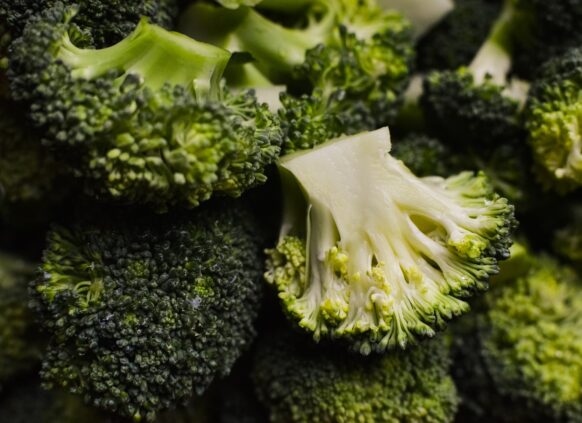
Broccoli
A delicious, fantastically healthy vegetable with just 34 calories per 100 grams, packed with record amounts of vitamin C, K, and beta-carotene, as well as calcium and iron. Bonus: Glucosinolate – healthy antioxidants that protect against cancer and arteriosclerosis.
Spinach
Only 17 calories per 100 grams – so feel free to add a splash of cream! The cream helps bind the oxalic acid in spinach and makes the abundant iron more bioavailable. Spinach also contains vitamin C, the vitamin A precursor beta-carotene, magnesium, and potassium.
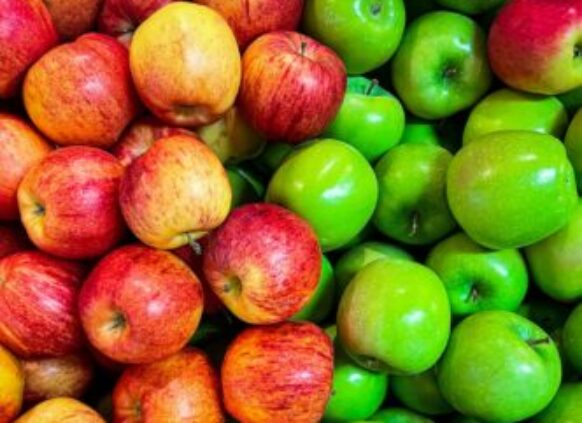
Apples
An apple a day… 70 sweet, vitamin C-rich calories that you can easily pack as a snack. Be sure to eat the peel (washed) – it contains healthy pectin, which helps lower cholesterol.
Carrots
Only 39 calories per 100 grams, rich in fibre and full of beta-carotene. This is not only great for your eyes but also helps keep your skin healthy and strengthens your immune system.
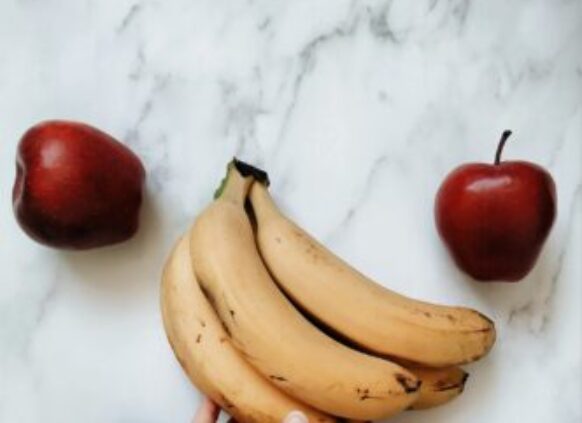
Bananas
95 calories per 100 grams – bananas are the perfect snack for a quick energy boost. They also provide potassium, magnesium, and vitamin C. Small, snack-size bananas are ideal for lunch boxes, kids and dieters. Also, the pectins in bananas help lower cholesterol.
Berries
Berries are easy to eat, especially when you can put a handful on your breakfast. There are about 45 calories in 100 grams of berries. Dark berries – blueberries, blackcurrants, and blackberries – are especially rich in anthocyanins. These antioxidants stop inflammation processes, making them very healthy for people with overweight or diabetes and everyone else.
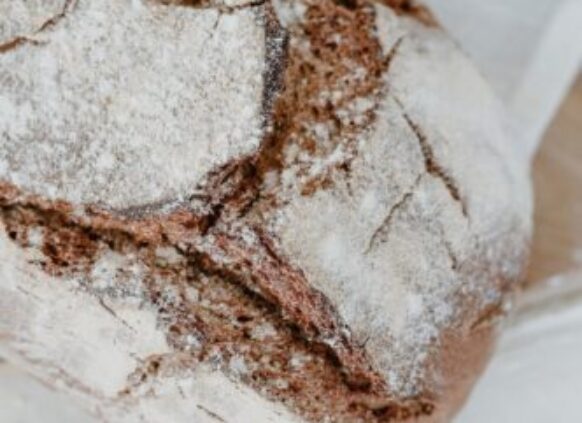
Wholegrain bread
Wholemeal flour contains about three times the fibre and significantly more B vitamins and iron than white flour. The high fibre content ensures that the carbohydrates are digested more slowly: your blood sugar rises gradually and stays elevated longer – keeping you fuller for longer. Look for “100% wholemeal” to get the most nutrients.
Brown rice
Even with rice, wholegrain is better: more fibre, vitamins, and minerals = higher nutritional value. Try brown basmati rice for the best balance between taste, nutrition and a low GI value.
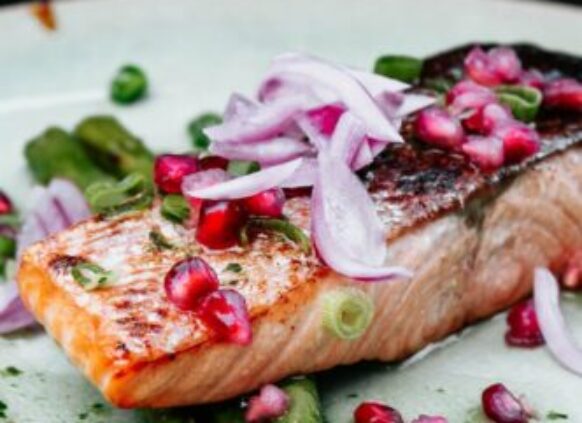
Fish
One of the most valuable sources of essential omega-3 fatty acids (think of oily fish like salmon, herring, halibut, tuna, mackerel, and anchovies). Omega-3 fatty acids are good fats: they can positively influence health issues associated with excess weight, such as high blood pressure, increased fat levels, and inflammation.
Chicken
Around 100 calories per 100 grams, very low in fat, no carbohydrates, and an impressive protein content of nearly 25 grams: chicken can be great for your weight loss journey – as long as it’s not fried.
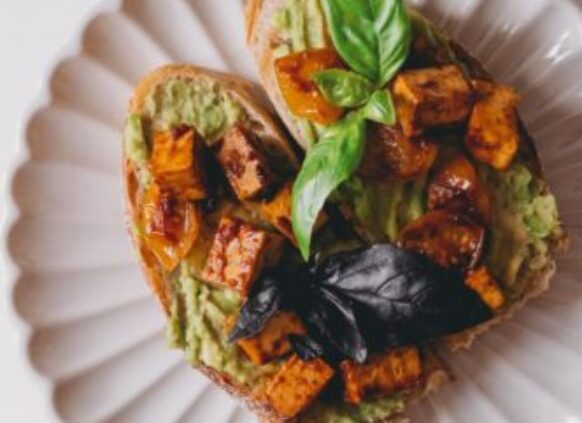
Tofu
Tofu is a plant-based protein source with the best amino acid balance: it contains all essential amino acids. It also provides B vitamins and vitamin K. With 140 calories per 100 grams, this product made from fermented soybeans is also light on calories.
Avocado
This completes your salad and is a star on wholemeal toast: around 200 calories per 100 grams, but packed with healthy unsaturated fats and almost all essential vitamins. The creamy fruit is also rich in fibre.
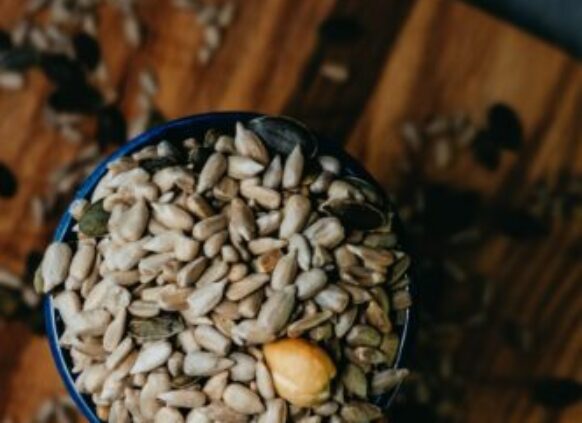
Chia seeds
Make an extra-creamy pudding with chia seeds, oat milk, and fresh fruits for breakfast or a snack packed with fibre and omega-3 fatty acids! Chia seeds are indeed a superfood.
Nuts
Nuts are high in fat and energy – yet still healthy; they help lower blood fat levels. Almonds comprise about half-good unsaturated fats and a quarter of protein. Their fibre content even exceeds that of wholemeal flour and vegetables. This makes them a great snack. To avoid overdoing it, keep nut portions to 30 grams: a small handful.
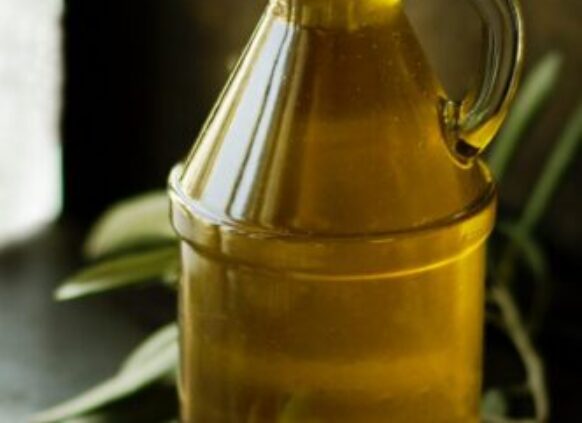
Olive oil
Extra virgin olive oil is the key fat in the healthy Mediterranean diet, which, for some, can be one of the best diets to lose weight. Rich in valuable unsaturated fats, vitamin E, and anti-inflammatory secondary plant compounds. By the way, rapeseed oil is similarly healthy but more affordable. Use it for frying – and save the good olive oil for cold dishes!
Oviva patient success stories:
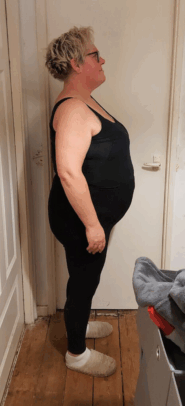
 -22kg
-22kg
Heidi (53)

 -25kg
-25kg
Martin (34)

 -32kg
-32kg
Patricia (53)
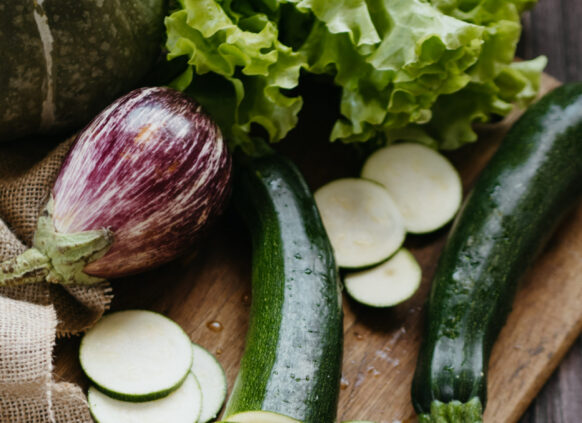
Vegetables and fruits: your best allies for weight loss
Vegetables and fruits are undeniably your best allies on your weight loss journey. They are the best foods for weight loss because they are low in calories and rich in fibre, vitamins, minerals, and antioxidants, all essential for a healthy diet.
Fibre is a key element in vegetables, fruits, and whole grains that helps you feel full longer. It slows digestion and prevents cravings, helping you control your calorie intake.
Vitamins and minerals in vegetables and fruits support overall health, including immune function, bone health, and cell function.
Antioxidants are compounds found in many fruits and vegetables. They help protect the body from damage caused by free radicals and may reduce the risk of chronic diseases such as heart disease and cancer.
Not all fruits and vegetables are created equal. Some are richer in certain nutrients than others, so eating a variety is important to ensure you’re getting a broad range of nutrients. The best vegetables for weight loss can be found in our table above.
Whole grains and proteins: why they are important
Whole grains and proteins play a critical role in a balanced diet, especially regarding weight loss. Unlike their refined counterparts, whole grains retain all parts of the grain—the bran, germ, and endosperm. Foods made from these grains are high in fibre, protein, and other essential nutrients.
Proteins are also a vital part of a healthy diet. They are essential for muscle building and maintenance and help promote satiety. A high-protein diet can help you feel full for longer, leading to reduced calorie intake. The best whole grains and proteins for weight loss are listed in the table above.
Healthy fats: not all fats are the same
When it comes to weight loss and healthy eating, fats often get a bad reputation. However, it’s essential to understand that not all fats are alike. There are actually fats known as “healthy fats” that play a significant role in our health and well-being.
Healthy fats, especially omega-3 fatty acids, are essential for our bodies. They support heart health, reduce inflammation, and can even help lower the risk of chronic diseases. They are found in various foods, including avocados, nuts, and seeds.
Avocados are an excellent source of healthy fats. They are rich in monounsaturated fats, which can help lower “bad” LDL cholesterol and raise “good” HDL cholesterol. Since avocados are pretty high in calories, watch the portion size: 50 grams or approximately half of a small avocado.
They are also a good source of fibre, which promotes satiety and can assist in weight loss. However, the high demand for avocados has led to intensive farming practices often associated with deforestation and high water consumption, so it’s advisable to consume them in moderation and choose local, seasonal products when possible.
Flaxseeds, chia seeds, walnuts, and olive oil are also excellent sources of omega-3 fatty acids and fibre.
Nuts and seeds are also rich in healthy fats and provide a good portion of protein. They are an excellent snack option to help you feel full and avoid cravings.
If you’re not sure where to get started, our 7-day healthy meal plan, designed by dietitians, can help you create some positive eating habits. You can also get to know how to make your diet healthier by understanding the kind of foods to reduce when losing weight.

Get the right support
When it comes to changing your lifestyle and finding the best foods for weight loss, you don’t need to do it alone. Oviva is here to support your journey with the following:
- Access to healthcare experts like doctors, dietitians and psychologists
- Personalised nutrition and lifestyle support
- Weight loss injections like Oviva
Join 1,000,000 people making sustainable changes to their food choices, activity and behaviour. Oviva’s weight management programme is accredited and funded by the NHS.
